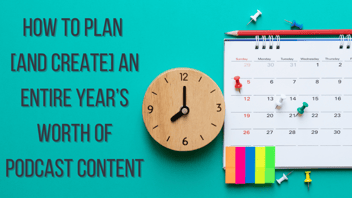
If you’re planning to start podcasting or maybe you have recently started, one of the first challenges you have to face is coming up with podcast episode ideas.
Coming up with an initial topic may be easy - perhaps it’s the reason you decided to start your podcast.
But to keep your channel running, you need topics and guests for a constant content flow.
Podcasting is a long game.
Most podcasters take years before they see any real growth in listenership and revenue.
For example, the top 100 podcast shows have upwards of 200 episodes of content. That means you need to be consistently producing episodes that listeners will enjoy. Those episodes should also be parallel to your podcast goals.
If you’re having a hard time deciding on the next topics to talk about, well, you’re reading the right article. The following are ten simple ways for you to come up with podcast episode ideas.
1. Your opinion matters.
What is the goal of your podcast? For starters, feel free to share your perspectives on that particular topic. Your podcast channel should be a medium where you can voice out your opinions, questions, and answers to issues and topics that drive your passion. Recall the questions that have been lingering on your mind. Is it about wealth, marriage, sports, etc.? What issues are important to you? How do the problems of the world intersect with your podcast? Write all those down and process them through your episodes. People love to hear someone else’s perspective on things that matter to them, too—your opinion matters.
2. Determine your target audience.
The next question is, who do you want to reach? Imagine your audience. Is your audience made up of students? Athletes? People in business? Parents? As you figure out the type of audience you wish to cater to, think about the questions that they may also have in their minds. Think about their needs and wants, desires, and concerns. These are additional topics you may also explore later through your podcast. For each subject, write down a potential guest you would like to collaborate with. You can share both your opinion on the topic and then have a guest on to dive deeper into the content.
3. Get inspiration from other podcasts.
Aside from the target audience, you may also want to know about your competition. Check other podcasts that are discussing topics similar to yours. As you listen and evaluate other podcasts, more ideas may come to mind. You may also see them from different perspectives and have questions that haven’t been asked or answered in other podcast channels. These can surely make you stand out from your competition.
This step will also help you develop your podcast such that it will be unique not just in topics discussed but in how they are discussed as well. Explore other formats of podcasts such as monologues, storytelling, interviews, commentary, or entirely freestyle. You can even create a series of episodes or separate shows that will discuss one topic thoroughly.
4. Consider using Quora
One of the easiest ways to generate episode ideas is to answer burning questions online. Quora is an excellent way to both create content ideas and an audience. Quora is a question and answer website; people post questions, and others answer the question as best as possible, with readers voting the best response. Search for your topic at hand and list the questions that resonate with you. Answer those questions in podcast format. Go a step further by answering the questions on Quora and adding your podcast link at the end of the answer for some added traffic.
5. Amazon is a goldmine for ideas
Amazon’s bookstore is still one of its biggest sellers. Chances are, there’s a book on your topic of choice. You can use Amazon to generate ideas in two ways. First, look at the titles and subtitles of books in your niche. Note which ones resonate with you. Can you answer what the book is trying to convey in one or two episodes? You’ll likely get several ideas from this alone. Next, check the reviews from customers. Specifically, look at the 3-star and 2-star reviews. These are persons who read the book and will be able to give fair commentary on what’s missing. You can then try to answer those questions in episode format.
6. Don’t forget about Reddit
Like Quora, Reddit is a great forum where people discuss anything under the sun. Reddit has a close-knit community, with strict rules, so don’t go sharing podcasts or links if it was not requested. However, the site is a powerful resource for content ideas. Search for your topic keyword in the search bar at the top of the page. Then jump into a discussion to get ideas from Redditors. You’ll see pain points and questions about your topic, and you can easily convert into podcast content.
7. People also ask?
You can always rely on good ol’ Google! Search for your topic of choice in the Google search bar. Page one has this cool feature, where it gives you a “People Also Ask” section. This section has questions about your topic that you can touch on. It’s a simple way to come up with tons of ideas. For an extra boost, use a site like Answer The Public, which uniquely aggregates google questions.
8. Pull more content from interviews.
If you are not comfortable or confident enough to discuss a particular topic that would interest your audience, it doesn’t mean that you shouldn’t discuss it at all. Instead, you can take this as an opportunity to bring another voice into your podcast. Conducting interviews will often bring a fresh perspective to your audience. However, as you deep dive into a topic, more questions will arise. Make sure to go over your previous interviews and pick out the deeper parts to flesh out into one or more episodes.
9. Everyday life has some content too.
Since it is your podcast, you don’t have to worry too much about having strictly structured episodes. Once in a while, you may have “series breaks” and share something from your everyday life as well. Why do that? This helps your audience know you from a different angle. It will also help them understand why you have an individual perspective or stand about a particular topic. Suddenly had a realization while driving? Share that with your audience. Saw something interesting while you’re out on the run? That can be great content. It doesn’t have to be too informative or even lengthy. The point is to help your audience know and understand you deeply while adding some much-needed variety.
10. Ask your audience.
If, after doing all those steps above, you suddenly found yourself running out of episode ideas, don’t be afraid to ask your audience. At this point, you surely would have grown several listeners. By doing this, you don’t just come up with new ideas. You also make your audience feel they are being heard and valued. So it is a win-win for both sides.
Get started on your podcast today.
Before you say it, we know these are all easier said than done. But you still have to start somewhere. Don’t pressure yourself to come up with many podcast episode ideas right away. You can start with just a few. Then as you record and publish your podcast episodes, more topics will come to mind. Just look around, research, listen and be open. You just might be surprised when a podcast idea will present itself to you.
One more thing
If you need help growing your podcast, you’ve come to the right place. I’ve created high-quality content through my top-ranking Brutally Honest podcast. On my blog, you can also find details on how to start and grow your podcast. Connect with me here for more help on building your podcast and generating content on other platforms like LinkedIn.





